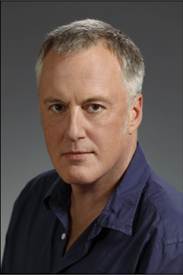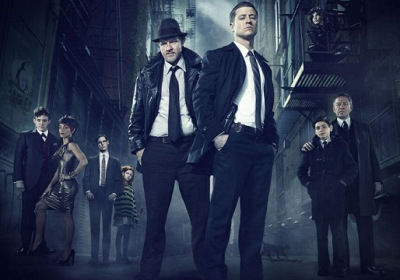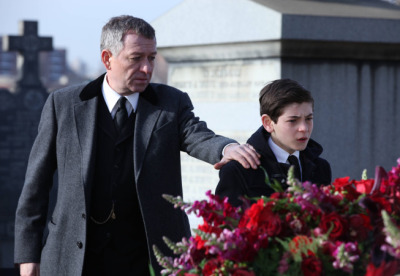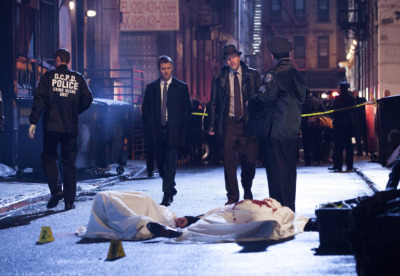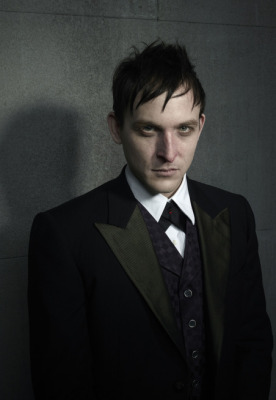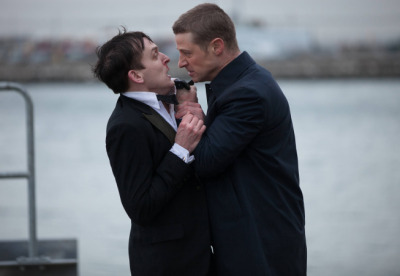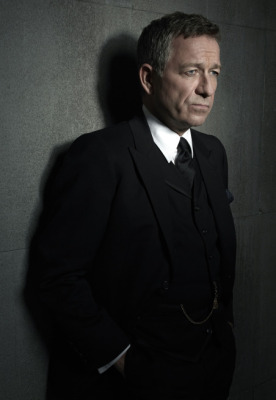I recently had the opportunity to take part in a conference call Q&A with Bruno Heller, creator of FOX’s new series Gotham (Mondays, 8/7C) – or I should say, got to call in. It’s a sign of just how much this series is being anticipated that I called in forty minutes early, punched in the appropriate code to queue up to ask a question and then never actually got to ask it (by way of comparison, usually if you call in twenty-to-twenty-five minutes early you not only have a good shot at getting your question asked, you have a shot at being the first in line).
Prior to Gotham, Heller created three series that have definitely primed him for adapting material from DC Comics’ Batman mythos: the dark, quirky and critically acclaimed American version of Touching Evil; the epic historical drama Rome, and the clever procedural The Mentalist. The pilot for Gotham has the darkness of Touching Evil and the epic quality of Rome, as well as the intelligence of The Mentalist. Although no one brought up how his previous creations helped prepare him for Gotham, his thoughtful responses to the journalists/bloggers who did get through showed, however indirectly, that he has built this series on the foundation of the elements of his earlier shows.
Bruno Heller: Hello, everyone.
Thank you so much for taking the call.
Bruno: Oh, not at all.
I really enjoyed the premiere, by the way.
Bruno: Oh, thank you. I’m proud of it.
I had a couple quick questions. One, it looks like a very conscious effort to put so many characters in the pilot, and I think it’s been generally positive, people have been pretty positive about that, but there’s been a little bit of – just not sure about that, or just think it was definitely a lot. I think maybe you agree it was a lot. Just wondering your thought process on why you did that. And, in future episodes, will it be more of a “villain of the week” or what’s the plan for the future, as well?
Bruno: You make a good point. Obviously, the demands of opening big mean that we will frontload it with lots of characters in front just to indicate where we’re going. As the show rolls on, it won’t be villain of the week simply because these are such great villains and their story lines are so big and epic that it would be short changing everyone if we did it in that sort of production line way. So there are a lot of big characters in that first episode, but as it rolls on, other iconic characters will be introduced, but in a much more measured way, if you like.
Good, makes sense. Then, just a followup, recently Ben McKenzie and Cory Michael Smith … discussed just the anticipation for the premiere, how it’s been kind of a long time coming. I guess, how would you describe, then, the mood on the set or in the writers room right now in anticipation for the premiere?
Bruno: One of key tasks of my job and the set in general is not to let all of that hoopla that is off the set affect what is going on the set. The set is a world unto itself and we’re just trying to make the best show we can. The anticipation for the show and the brilliant job of marketing that FOX has done is really, kind of, another world. Inside the world we live in, certainly it’s hard, but we try and – not ignore all of the anticipation, but let it go by without getting too excited.
What I’m really interested in is the city of Gotham itself on the show. The show is called Gotham; I’m wondering how much the city itself really shapes the story you’re telling.
Bruno: Very much so. It’s an urban story, it’s about city life. I think often it’s kind of a dream world that everybody shares. Everyone has a vision of Gotham in their mind, so you really have to create a three-dimensional, believable world that is both believable but a notch above reality, that has that fantastic element. Both me and Dan Cannon, the director, had kind of seminal moments in New York in the ‘70s when it was a really gnarly, dark, but very sexy and attractive, charismatic place. So that’s the seed of the city is that old New York.
The show very much relies – Danny and his crew did such an amazing job creating a believable but fantastic world. What that allows us to do is it allows the actors inside that city to be a notch up. It’s both real but slightly surreal, and that means you have a broad and powerful canvas to work off of.
So Gotham is a central character. It’s not an accident we call it Gotham.
I was wondering, though, as a prequel series and an origin story, what did you look at and draw inspiration from for the series? Especially if people are normally used to seeing Bruce Wayne as the Dark Knight and not as his younger self, and a lot of the focus is going to be on Jim Gordon and Gotham, as a whole.
Bruno: To me, the immediate attraction of this story was precisely the chance to tell origin stories. Those are always the aspects of the superhero legends that I enjoy most. It ties into a kind of childlike curiosity of how did things get the way they are? It’s just the Just So Stories, Rudyard Kipling, How Did the Leopard Get its Spots?
This is a world that everyone knows. Everyone knows who Batman is, everyone knows who the Riddler is and who the Joker is, so telling their fully fledged, adult stories is kind of – it’s not been-there-done-that, but it’s tough to find a fresh way in. This way, you get to learn how things go to be the way they are, and that, to me, is one of the great gifts of good narrative. It’s like seeing pictures of your parents before you were born. There’s something intrinsically fascinating about that period before the period we know, and that’s really the feeling we were going for. I hope that answers the question.
Shows like Arrow and Smallville have proven that mainstream superhero shows can be successful ventures. How have these shows had an impact on the production and development of Gotham? Would a show like Gotham even be possible, say, 10 or 15 years ago?
Bruno: That’s a good, deep question. Yes, I would say certainly both of the shows you mentioned are Warner Bros. shows, and the DC Universe is now very much a part of Warner Bros. culture. I’d been talking with DC for many years before we got to this point and landed on Gotham.
I think you’re probably right, it wouldn’t be possible, and I think that’s a combination of the brilliance of what the Nolans did to revivify the Batman franchise and also the shows you mentioned. People could see that there’s both an audience and a way of convincingly doing that larger than life world on the small screen.
I would say that the difference, to a degree, between those shows and this show is those were cable shows, this is network, and there are slightly different demands, there. The analogy would be those are arena shows and this has to be a stadium show and has to appeal to an even larger audience. So it has to appeal to both people who love Batman and love Gotham and love that world and also people who have no particular love for the world and you just have to grab them on the strength of the story and the characters.
But yes, absolutely, all of those – one of the things about working for an old school studio like Warner Bros. is there is a kind of institutional culture and institutional memory, both in terms of production design, camera work, directors who understand how to do this kind of thing. So it’s very much within the parameters of the wheelhouse – that’s definitely a mixed metaphor, but you get my point. Absolutely, we’re in the middle of, just like in the 50s it was a Western cycle, we’re in the thick of a superhero cycle, here.
Warner Bros. and Netflix recently agreed to the exclusive streaming rights to Gotham. Is this direct to subscription television ineffable and how do you see this sort of thing effecting big, stadium projects like Gotham in the future?
Bruno: Well, I’m the last person to ask about business because what I can’t control, I don’t worry about or get too deep into. But it certainly makes – all of these new outlets and the various deals that can be made to back a project can only help in terms of creating larger and more ambitious TV events. That’s the way it’s going; you have to break through, you have to invest a whole lot more money and a whole lot more of your resources to make things pop out of the vast landscape that now exists for TV.
The Netflix deal is part of that movement. It allows the creative people to take more chances and to, you know, use more color and a broader canvas just to start with.
You do some very interesting spin on some of the characters we know, especially the Penguin, who really stood out as unusually vicious, even for that character. When you were developing the show, how much did you decide to stick to the comics versus decide to just take your own way with those characters?
Bruno: It’s a tricky balance, because obviously you don’t want to simply create a new character. You have to create a character that is that iconic character and you recognize who that is and they have to have their iconic characteristics. But on the other hand, if we just deliver the character that people have seen before, than we’re failing the audience. There is so much – the Batman world is such a vast world full of so many great iterations of these characters that you can’t simply take those elements and regurgitate them. You have to give the audience a fresh look.
For me, with Penguin, it was important to be true to the psychology of that kind of person. The sort of graphic novel version of the character, as opposed to a comic book version of the character. In comic books, I wouldn’t say he’s more comedic, but he’s not – it’s hard to distil it down to an essence. It just seemed to me that that kind of person has to have some kind of [indiscernible] with his character. There’s also a certain amount of charm.
Also, this is Penguin as a young man, striving and struggling and hungry. That’s going to be a very different character from who he is [indiscernible] and has reached his goals in life. Right now, he’s that hungry, violent, scrabbling character that he must have been to get where he got to.
In general, like I say, it’s important, even if some of the audience [indiscernible] goes that’s not my idea of that character, well at least a little friction and a little controversy in those terms is not a bad thing. All I can promise is we work very closely with Jeff Johns at DC to make sure we’re not betraying the essence of who these people are, because that would be pointless. We’re never going to sort of change up the characters simply for the shock value of changing them. It’s just our [indiscernible] is to deliver something new and interesting, and that involves taking chances now and again.
We know who almost all of the characters are eventually going to become, if you’re a fan of the mythology, so what has the process been like creating the path that leads each character to their eventual destiny?
Bruno: I guess the main challenge there is reverse engineering enough that we have a journey to take without destroying all of the iconic elements of the characters that people know and love. But at the same time, you want that journey to be as long and as interesting as possible, so we can’t start with the fully fledged characters, even if we wanted to. There’s a whole bunch of history that has to happen before those characters emerge in all their finery.
For me, that’s a big part of the fun of the show, both making it and watching it, I hope, is seeing these people as young people and seeing how they’re going to change over time and giving them space to grow. It’s hard to describe in simple terms how that works.
A lot of the challenge with TV as opposed to making movies is that you have to leave room for the characters in the story to tell themselves. Sometimes you don’t know where a character is going to go and what’s going to happen to them until you’ve seen the actor take that part and make it their own. Then, you know, sort of like novelists say the book starts to write itself, the characters start to tell their own story, and then we know where they’re going as opposed to mapping it out step by step. We have broad, general [indiscernible], but you’ve got to leave space for these characters to live and breathe, you know. I hope that answers that answers the question.
I was just going to ask you about your challenges, so I guess I can’t ask that. Is there, maybe, a favorite scene that you can talk about without spoiling too much?
Bruno: Favorite scene? Danny did such a great job. I very rarely watch the first few episodes of a series with glee. I tend to see the things I wish we’d done differently. But with this, I thought it was all gripping. To a degree, my favorite scene is the opening sequence. It played out pretty much as I’d seen it in my imagination, so that was a thrill.
I also think the scene in the pilot with Penguin and Gordon on the waterfront has such cinematic juice that you can so rarely achieve on TV. But yes, if I had to point to an individual scene, that would be it. Two great actors really bringing it and a director really catching it. So yes, that would be it.
We know all these characters that you’re going to include, and a lot of people know about characters that we hope you include, but are there any characters in the stories or the comic books that you knew from the beginning you would absolutely not include on the show and why? Are there any parts of the DC Universe where you definitely don’t want to go?
Bruno: There are certain characters that would be very, very difficult to put on the screen. That crocodile guy is a tough one – although we may go there. We haven’t excluded anyone from the mix, potentially. But generally what we’re looking at is characters where there is some drama or a story behind how they got to be the way they are, and we’re looking for characters who can live in the real world of Gotham as opposed to the even more super-real world of Metropolis, if you like. It’s not about super powers; it’s about super will, if you like. So we have veered towards those characters who are interesting as people rather than interesting for their particular power or their particular gimmick or their costume. So that’s how I would divide that world.
But the simple answer is no. We’re ready to go with any of them.
I wanted to ask a little bit about the choice of Sean Pertwee as Alfred. He’s such a different kind of presentation of that character, and obviously he’s going to be a very strong father figure, but then you also have Ben as another, with Gordon acting as another father figure. Is that playing out very deeply, or does it get too much into Bruce’s story, which you have to play very lightly with the first season?
Bruno: I’m sorry, I didn’t catch the question.
Just in terms of the choice of Sean’s different take on Alfred and then how much of the conflicting father influences will play a part in the first season.
Bruno: Yes, I get you. You know, absolutely there’s sort of – I wouldn’t say he’s the bad father, but he’s certainly the permissive father, the enabling father as opposed to Gordon, who represents the law. What Sean brings to it is a kind of avuncular strength, but also a sense of irony and a sense of – he has strength and power, but he’s – liberal is the wrong word.
To take it a step back, in order for Bruce to turn into Batman, Alfred had to be an enabler, there. Bruce could not have done this in secret; at some point they made a pact, whether an unspoken or a spoken pact, that this was going to be allowed. So you had to have an actor with an edge of danger to him, who was not simply the good, loyal caretaker, but also someone with his own sense of rage inside him. Someone who could carry that, but lightly, and that’s what Sean does so brilliantly. He is exactly like – and to me, that’s who Alfred was, he was like one of those great – which is what Michael Cane used to play. I’m not sure that it is such a leap from the previous characters. It’s a leap from the very old style of Alfred where he’s kind of much more the English butler than the soldier.
We went for a dynamic character who can carry his own stories, who is a genuine, positive, dynamic influence in Bruce’s life, and that requires an actor with great charisma and strength and also, underneath, you have to feel that he loves and cares for this kid. So it’s a very tricky line he’s walking, there, but he’s walking it brilliantly.
Photos by Jessica Miglio and Michael Lavine/Courtesy of FOX
